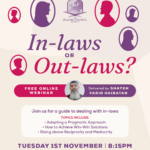‘‘There are four signs that make someone a pure hypocrite if he has them all and whoever has a characteristic form them has a characteristic of hypocrisy until he abandons it: when he speaks he lies, when he makes a covenant he is treacherous, when he makes a promise he breaks it, and when he argues he is wicked.’’[1]
Introduction
Conflicts and disputes are bound to arise among couples once they start to live together. No matter how great, happy or compatible the couples are, disagreements and conflicts will be a normal part of the relationship. The key is not to imagine that you can avoid these conflicts in its totality, because that is a failed strategy as it is inevitable, but in how to resolve them in a healthy, Islamic and just manner when they do occur. The Sharī‛ah has provided some key principles and put in place certain mechanisms to resolve your disputes, whereby every disputant will achieve their objective interests in a fair and balanced way.
Whether the spats and fights you have with your spouse are big or small, the number one thing every party must keep in mind and practice is, to have Taqwā (fear/consciousness of Allah). This might prove to be difficult when you are in the heat of an argument, but if you train yourself from the beginning, then it will help you to be reminded of it when a dispute does arise.
The linguistic meaning of Taqwā comes from the root wa-qa-ya, which means to shield or safeguard oneself. When Allah commands us to have Taqwā, in essence He is telling us to safeguard and shield ourselves from His Wrath by doing that which He has commanded us to do and abstaining from that which He has forbidden us from.
So why is Taqwā so important? Well, not only because Allah has constantly reminded the believers, including the Prophet (ﷺ), to have Taqwā, but because it will help us in our dispute. This article will mention some of the blessings of having Taqwā in marital dispute in order to bring about a positive outcome from it.
Blessing #1: Connecting with your spouse on a human and spiritual level
Suppose your spouse accuses you of something, which you know you are guilty of. By having Taqwā, you will admit to it and take the necessary steps in rectifying it. Now this brings about an immediate end to the conflict being exasperated further, because when you admit to a mistake you will gain the sympathy of your spouse. They will see you as a human, just like themselves; someone who is prone to committing a mistake or error. When anyone, let alone your own spouse, connects with you on this human level, they are most likely to feel sympathy and forego the matter. On an Islamic level, they will connect with your Taqwā, knowing that, despite your weaknesses and mistakes, you will fear Allah, speak the truth, and turn to Him at the end of the day. This will make you a stronger and better believer!
Allah says:
O you who believe! Keep your duty to Allah and fear Him, and speak (always) the truth.[2]
The Prophet (ﷺ) said:
All of the children of Adam are sinners, and the best sinners are those who repent.[3]
Additionally, part of having Taqwā in a dispute is being just (‛adl). Part of being just is to take responsibility when you are blameworthy. When you admit to your mistake, by being a witness against yourself, and taking responsibility for it, you have gained two praiseworthy and noble traits for a mistake that you just made; being just and having Taqwā! How beautiful is that!
Allah says:
O you who Believe! Stand out firmly for Allah and be just witnesses and let not the enmity and hatred of others make you avoid justice. Be just: that is nearer to Taqwā, and fear Allah. Verily, Allah is Well-Acquainted with what you do.[4]
And if you are not guilty of what you are being accused of, having Taqwā will help you to be level-headed. This will help you in not overreacting when explaining the situation, remaining calm and clearing up any misunderstanding in a polite manner. The opposite will be to accuse your spouse in return, become agitated and furious and transgressing against their rights. All of which are not characteristics of a believer who fears Allah, but rather characteristics of a hypocrite.
In the above Ḥadīth, the Prophet (ﷺ) described two of the four characteristics of a hypocrite, saying:
…When he speaks, he lies…and when he argues he is wicked.
Blessing #2: Allah does not turn you down
The second blessing of having Taqwā during an argument is that, if at fault, you will make a promise in rectifying the situation. This promise is not only because of your commitment to your spouse, but a commitment, first and foremost, to Allah due to your Taqwā of Him! Remember, you have made your spouse ḥalāl for you by His Word and under His Covenant, and it is important that you fear Allah when it comes to fulfilling your Covenant. You will be liable for not fulfilling the rights of your spouse, and if they can’t get it in this world because of their vulnerability and weakness, then it will be taken from you on the Day when you will be vulnerable!
When you make a sincere commitment to resolving the matter, you will have the help of Allah in doing so. Allah loves those who are humble and helps those who are sincere towards Him and His creation. When describing the characteristics of a righteous Muslim with Taqwā, Allah mentions a few traits of theirs and one of them is, being truthful (sidq) and fulfilling their promises.
Allah says:
Righteousness is not that you turn your faces toward the east or the west, but [true] righteousness is [in] the one who…fulfill their promise when they promise… Those are the ones who have been true (sidq), and it is those who are the Muttaqīn (people of Taqwā).[5]
As mentioned earlier, marital differences and conflicts are natural and inevitable; Allah allows it as it is part of human nature. Yet, in order to test which one of them are believers and have Taqwā, Allah will test their sincerity in resolving conflicts according to His Laws and Commands. So rather than provoking more conflict and fuelling the fire that flames it, fear Allah, have patience and be sincere in your resolve to ending conflicts in a just manner, and Allah will not let your efforts go to waste.
Prophet Yūsuf, when confronting his brothers at the end of the story, reminds them that the person of Taqwā will always win!
Indeed, he who fears Allah and is patient, then indeed, Allah does not allow to be lost the reward of those who do good.[6]
Being treacherous, breaking promises and being conniving, will only prove that you are insincere towards the Covenant of Allah and deceiving yourself. Furthermore, treachery and deception will not harm anyone except the one who plots it, especially if the other party is someone who has Taqwā of Allah, is patient and sincere towards conciliation.
Allah says:
…And if you are patient and fear Allah, their plot will not harm you at all. Indeed, Allah is encompassing of what they do.[7]
In the above Ḥadīth, the Prophet (ﷺ) described two of the remaining characteristics of a hypocrite, saying:
…When he makes a covenant he is treacherous, when he makes a promise he breaks it…
The only way out of becoming a complete or partial hypocrite is to start practising Taqwā in all of your affairs, starting with your spouse and family.
Blessing #3: Allah’s ease is near
The third blessing of practising Taqwā in a dispute is that Allah will always find a way out for you, even if it may be after some time. He will provide the means for you in order to rectify your affairs. According to our research at the Islamic Council, when a husband and wife are sincerely committed to embodying Taqwā during their disputes, Allah opens a way for them to reconcile. This reconciliation is a manifestation of Allah’s promise in the Quran.
Allah says:
And if you fear dissension between the two (husband and wife), send an arbitrator from his people and an arbitrator from her people. If they both desire reconciliation, Allah will cause it between them. Indeed, Allah is ever Knowing and Acquainted [with all things].[8]
But if you are always the one remaining calm or always taking the blame for your mistakes, or always trying to fix the problems in your marriage, yet it is still not leading to a resolution of your liking, then maybe Allah is preparing you for something better. Maybe Allah is making you a stronger person, a committed spouse or parent and a sincere believer. Maybe Allah is elevating your ranks in Jannah, and this is simply your test and trial in this world. And if, at the end, a separation is the result of all your disputes, then Allah will provide a way out for you. He will give you sustenance (a spouse) that is far more deserving of your love, attention and time than the previous one. But you would not have attained it, except that you had to go through the difficult trial with your ex-spouse while maintaining Taqwā
Allah reminds the Prophet (ﷺ) in Surah al-Ṭalāq (65) to have Taqwā when he is going to divorce a woman. Even in such an emotional, stressful and heightened tense moment, Allah promises numerous benefits for those who maintain Taqwā, throughout the Surah.
Allah promises, if you have Taqwā, to give you a better future:
You do not know (what will happen in future); it may be that Allah brings about a new situation thereafter.[9]
He promises to get you out of your difficult situation, if you maintain your Taqwā:
And whosoever has Taqwā of Allah and keeps his duty to Him, He will make a way for him to get out (from every difficulty).[10]
If you trust and depend in Allah and have Taqwā, He will provide for you:
And He will provide him from (sources) he never could imagine. And whosoever puts his trust in Allah, then He will suffice him. Verily, Allah will accomplish his purpose. Indeed, Allah has set a measure for all things.[11]
If you maintain your Taqwā during and after such an ordeal, He will make matters easy for you:
And whosoever fears Allah and keeps his duty to Him, He will make his matter easy for him.[12]
If you are steadfast in your Taqwā and don’t give up, He has prepared a magnificent reward for you:
That is the Command of Allah, which He has sent down to you, and whosoever fears Allah and keeps his duty to Him, He will remit his sins from him, and will enlarge his reward.[13]
All the above realities are mentioned in the chapter to do with divorce.
Conclusion
In closing, the 3 blessings of embodying Taqwā in your marital life are: 1) Connecting with your spouse on a human and spiritual level, 2) Allah will never turn you down, and 3) Allah facilitates and opens a way out for you in all of your affairs.
Lastly, it should be mentioned that the ultimate solution for any dispute, including marital discord, is always returning to Allah. Couples should make a collective effort to return back to Allah and submit to His Command when solving their problems. They should realise that the challenges of marital life are many and they can only overcome them if they both face them together, as a couple, united. The goals of marriages are too grand for petty arguments to deter you from achieving them. Therefore, always keep the end goal in mind, have Taqwā and be easy going with one another.
اللَّهُمَّ آتِ نَفُوْسَنَا تَقْوَاهَا وَزَكِّهَا أنتَ خَيْرُ مَنْ زَكَّاهَا أنتَ وَلِيُّهَا وَمَوْلاَهَا
Oh Allah! Grant our souls Taqwā and purify it, You are the Best of those who purify it, You are its Protecting Friend and Master!
[1] Ṣaḥīḥ al-Bukhārī, Ḥadīth 34, Ṣaḥīḥ Muslim, Ḥadīth 58
[2] Sūrah al-Aḥzāb, 33:70
[3] Sunan al-Tirmidhī, 2499
[4] Sūrah al-Mā’idah, 5:8
[5] Sūrah al-Baqarah, 2:177
[6] Sūrah Yūsuf, 12:90
[7] Sūrah Āl-‛Imrān, 3:120
[8] Sūrah al-Nisā’, 4:35
[9] Sūrah al-Ṭalāq, 65:1
[10] Ibid, 65:2
[11] Ibid, 65:3
[12] Ibid, 65:4
[13] Ibid, 65:5













